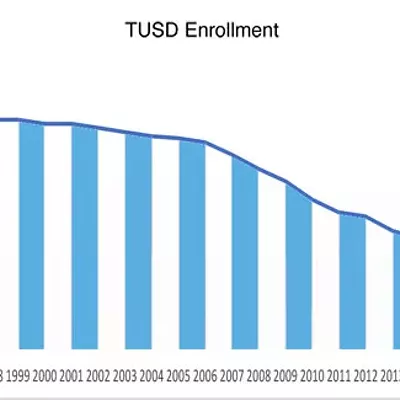A push by Republican lawmakers to repeal a controversial election-law package before voters can decide its fate met its first delay last week.
Rep. Eddie Farnsworth (R-Gilbert) pulled the bill from consideration by the House Judiciary Committee after a crowd of critics and TV news cameras poured into a hearing room last Thursday, Jan 23.
Farnsworth's legislation, House Bill 2196, is very simple in its language: "Laws 2013, chapter 209 is repealed."
But the potential impact is far more complicated. The legislation Farnsworth seeks to repeal is a set of changes to election law that would make it a crime for political operatives to collect early ballots and turn them in to election officials; make it easier to strike voters from the Permanent Early Voter List that ensures voters are automatically mailed a ballot in every election; and create more strict guidelines for groups that attempt to put initiatives on the ballot.
The legislation was bound together in HB 2305, which passed in the final hours of the 2013 legislative session. But the Protect Your Right To Vote Committee gathered more than 110,000 valid signatures to force a referendum, which put the new law on hold until voters can decide it on the upcoming November ballot.
Now Republican lawmakers are scrambling to head off the referendum by repealing the law, although some say they'd like to still enact its provisions once the threat of the referendum is called off.
When he announced he'd be removing the bill from the Judiciary Committee's agenda, Farnsworth told the press he wanted to work on the language of the bill—a somewhat amusing assertion, given the brief language of the proposed legislation.
HB 2196 has been scheduled for another hearing in the House Judiciary Committee this Thursday, Jan. 30.
Robbie Sherwood, a political strategist and spokesman for the Protect Your Right To Vote Committee, vowed to be there.
"I don't blame politicians for wanting a less intense spotlight for their efforts to stick it to voters, but the public is outraged by how these efforts to curb participation in elections and we won't go away," Sherwood said in a press release.
In other news around the Capitol:
• Sen. Steve Yarborough's "conscience clause" bill passed the Senate Government and Environment Committee passed the House Rules Committee on Monday, Jan. 27, setting up a vote from the full Senate. SB 1062 would essentially allow anyone to claim that their religious beliefs allow them to sidestep laws.
• HB 2284, which was still awaiting committee assignment earlier this week, would allow surprise inspections of abortion clinics. Under current law, the Department of Health Services can inspect abortion clinics if there is cause to believe there are problems, but the new law would allow state and local officials to inspect based on their suspicions.
• State Reps. David Stevens (R-Sierra Vista) and David Gowan (R-Sierra Vista) are sponsoring HB 2412, which would allow teachers and other school employees to carry guns on school campuses as long as they completed 24 hours of training set up the Attorney General's Office. The bill was awaiting a committee assignment as of Tuesday morning.
• Sen. David Farnsworth (R-Mesa) has sponsored SB 1151, aka the "No Chickens Left Behind Act." The bill would prohibit cities and towns from regulating chicken coops in anyone's backyard, although crowing roosters could still be banned. The bill has been assigned to the Senate Government and Environment Committee.
New Abortion Regulations
Elsewhere in state government: The Arizona Department of Health Services released new guidelines regarding the regulation of abortion clinics in Arizona, based on an anti-abortion law passed in 2012. Among the new rules are regulations designed to disqualify abortion providers, such as requiring doctors who perform surgical abortions to have admitting privileges at a hospital within 20 miles of a clinic and doctors who perform medical abortions to have admitting privileges at a hospital.
One of the major provisions involves new rules regarding the dispensing of medication to terminate a pregnancy. Medication abortions must now follow the protocol approved by the FDA in 2000.
That protocol—now more than a decade old—requires a higher dosage of medication than considered necessary by today's medical professionals. The FDA protocol also prohibits the use of the medication after seven weeks; clinics now use the medication up to nine weeks in the pregnancy.
Cathi Herrod of the Center for Arizona Policy, a Christian conservative lobbying group that has pushed for new abortion restrictions, celebrated the new guidelines.
"Abortion providers have an abhorrent track record of putting mothers in harm's way," said Cathi Herrod, President of Center for Arizona Policy. "By passing these standards, Arizona's leaders are working to protect the health and safety of mothers from the dangerous and deadly practices of the abortion industry."
But Bryan Howard, president and CEO of Planned Parenthood Arizona, said in a prepared statement that the new requirements would force doctors "to use an inferior, out-of-date method of care for medication abortion instead of the guidelines supported by the most trusted professional and scientific organizations, such as the American Medical Association and the American College of Obstetrics and Gynecology."
Howard also noted that the regulations "would deprive many women of the option of medication abortion by banning it after seven weeks of pregnancy."











